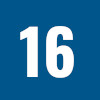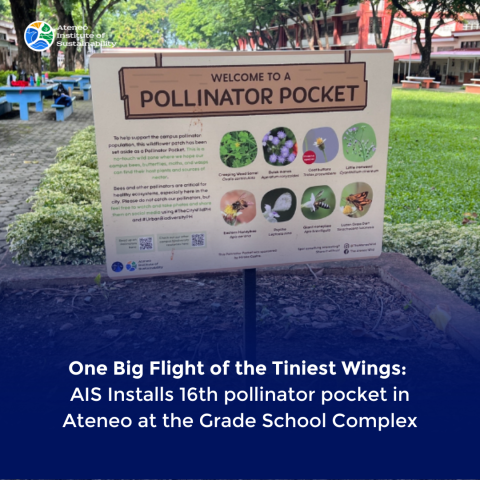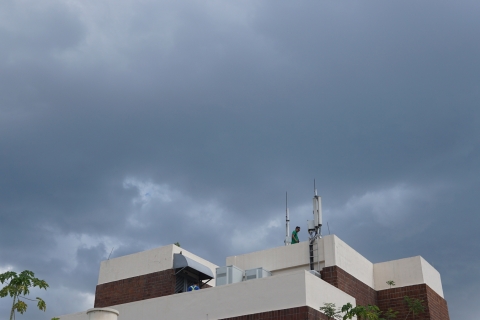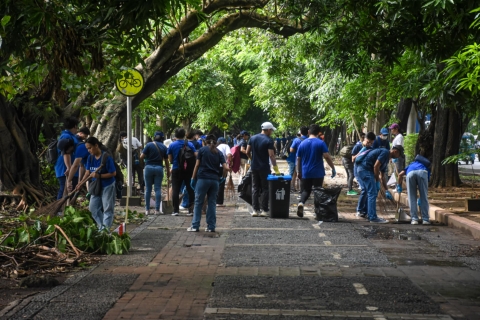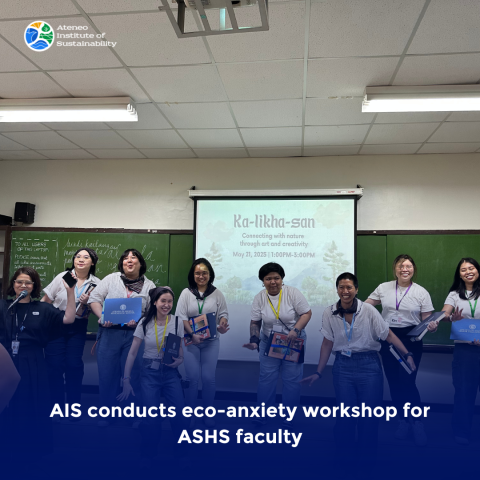SÚGAT Podcast on ‘Haiyan Afterlives’ highlighted in Climate Voices webinar
24 Jun 2024 | Maggie Ceniza and Ivy Geraldine Ferrer
On 17 April 2024, the My Climate Risk – Ateneo de Manila University (MCR-ADMU) Regional Hub, hosted by Ateneo Institute of Sustainability, organized a webinar titled “Podcasting Haiyan Afterlives: Stories from the Ground Zero and Beyond.” My Climate Risk is a lighthouse activity of the World Climate Research Programme, which aims to develop and mainstream a bottom-up approach to regional climate risk, and has a mycorrhizal network of hubs that span all continents except Antarctica.
The webinar featured Mr Ian Harvey A Claros and Mr Ram Paulo A Anayan as the resource speakers. Both are Lecturers under the Department of Filipino at the Ateneo de Manila University. Mr Claros teaches Filipino and Literature and the Environment, while Mr Anayan teaches language, rhetoric, and literature. For this webinar, Mr Claros and Mr Anayan discussed their work, a podcast titled “SÚGAT: Stories and Science for Sustainability.” SÚGAT was an Areté Sandbox Residency project which commemorated the 10th anniversary of Typhoon Haiyan (local name Yolanda) in 2023 by sparking multi-sectoral conversations in the Eastern Visayas.
Dr Ma Laurice Jamero, the Resilience Coordinator of the Klima Laboratory at the Manila Observatory, delivered the Opening Remarks. Dr Jamero reflected on listening to the stories of those who survived and remembering those who were lost during Typhoon Haiyan, particularly as we navigate the current climate crisis. She also shared how surviving Typhoon Rai (local name Odette) molded her mission to reduce the impacts of climate disasters on other individuals. Dr Priscilla Angela T Cruz, Assistant Professor at the Department of English at the Ateneo de Manila University, delivered the Closing Remarks. She contemplated the importance of listening to personal narratives, trans- and inter-disciplinary approaches to addressing the climate crisis, and maintaining a multi-linguistic character to allow the climate crisis discourse to give voice to a variety of communities. Both Dr Jamero and Dr Cruz are Collaborators of the Hub. Ms Jean Jardeleza Mijares, Program Manager for Climate and Disaster Resilience at the Ateneo Institute of Sustainability, served as the moderator for the session.
Mr Claros opened the session by discussing the Huia Call Transcripts, noting the limitations of representation of an extinct New Zealand bird. He highlighted how narratives may often turn to tropes that reduce the complexity of ecological relationships. Heise’s concept of nature as cultural and the use of synecdoche—where flagship species or charismatic megafauna are representative of broader conservation efforts—emphasize the unfortunate prioritization of certain animals over entire ecosystems. Alongside this, Mr Claros also touched on E Ann Kaplan's concept of pre-trauma, a state of persistent anxiety exacerbated by the effects of climate change, to examine existing trauma. These insights informed the storytelling approach for their podcast, ensuring a holistic view of environmental impact and the interconnectedness of human and nonhuman experiences.
Mr Claros also reflected on producing their podcast SÚGAT to mark the 10th anniversary of Typhoon Haiyan, describing it as both challenging and enlightening. He explored its history, vision, creative process, and the ethical considerations involved, adding that inspiration stemmed from literature and environmental studies classes. The name SÚGAT in itself carries rich meanings: in Visayan, it signifies a meeting or convergence, while in Tagalog, it means wound, capturing the mission to transform wounds from Haiyan into moments of convergence and contemplation. The podcast involved collaborators from Ateneo de Manila University, Visayas State University, Marikina Polytechnic College, and Université Catholique de l’Ouest. Its vision was to create an organic and inclusive initiative that stretched beyond Ateneo de Manila University and Metro Manila, reaching a broad and diverse audience.
The team behind SÚGAT chose a podcast format due to its low cost, portability, and flexibility, allowing the group and the participants expansive and dynamic conversations together with experimenting with the logistics and production of the project. A podcast format was also ideal for sharing unique, smaller-scale stories that explored human and nonhuman aspects of our relationship with the environment. The podcast could also serve as instructional material to encourage environmental literacy among the youth.
Mr Anayan explained the crucial role that ethics played in the process. The team conducted pre-interviews to create a safe space for guest participants, which also served as valuable material for organizing their content. This approach ensured that they respected the voices and experiences of those affected by Typhoon Haiyan, maintaining their dignity and privacy. He also addressed the challenges during production, such as distance, time differences, data privacy, and language barriers. Despite these obstacles, the podcast was popular with audiences not only locally but in countries such as Australia, the US, Germany, Japan, and beyond.
The webinar was attended by participants from the Philippines, with international attendees from India and Japan. This webinar is the second session in the 2024 iteration of "Climate Voices on the Ground: Perspectives from Different Sectors." The series occurred on Wednesdays of April 2024. Replays and highlights of the webinar series are available in the following page.


